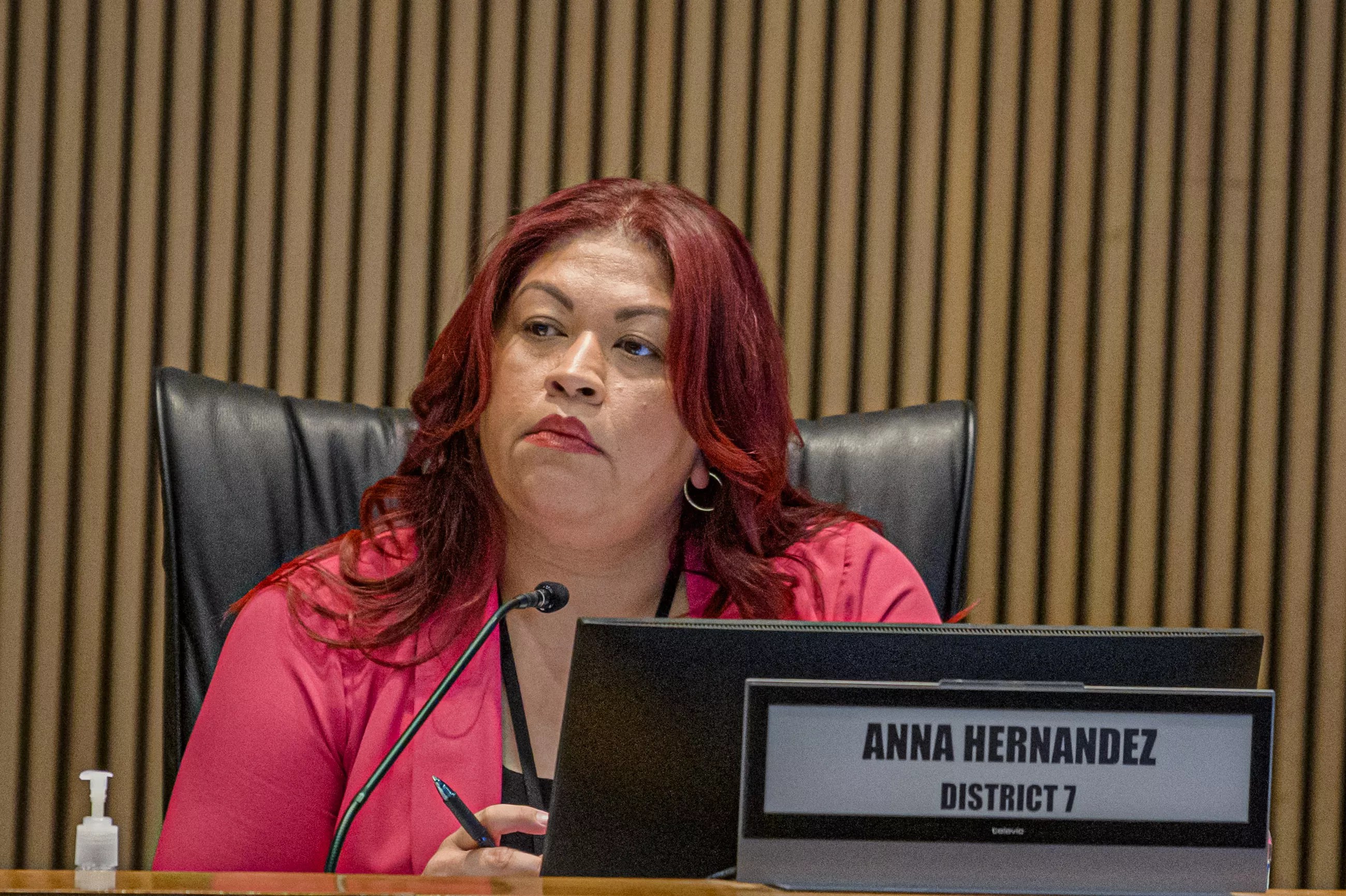
fsHH (Pixabay), CC0, via Wikimedia Commons

Audio By Carbonatix
In March, an Arizona resident was pulled over by Phoenix police for having expired tags on his vehicle. The offense, a civil violation that usually carries a $300 penalty, resulted in the man being jailed and subjected to deportation proceedings.
The man’s saga was shared with Phoenix New Times by Ben Laughlin, the co-director of the activist group Poder In Action. Laughlin said the man, whom he declined to name to protect the family’s privacy, was closely affiliated with the group. During the traffic stop, he’d handed over an ID that showed he was not a U.S. citizen. He was then arrested and booked into a Maricopa County jail, where Immigration and Customs Enforcement is present to check immigration status.
Now the man is in the midst of deportation proceedings, Laughlin said. Laughlin added that because the man was the primary source of income for his household, his family has since been evicted from their home and left without stable housing.
Since the beginning of Donald Trump’s second term, families across Maricopa County have watched ICE raid their homes, workplaces and community centers to detain any and all individuals who are unable to prove their immigration status. But some land in ICE custody in quieter and more indirect ways: a routine traffic stop or an arrest for a minor misdemeanor.
Laughlin shared the arrested man’s story to demonstrate the gap between what local law enforcement says – specifically, that they do not engage in immigration enforcement – and what local law enforcement often does. Earlier this month, an Arizona Department of Public Safety trooper called ICE on a man who’d been clipped by another car on the highway.
Stories like this are not uncommon. For local activists and immigrant rights groups – including Poder In Action, Aliento AZ and Trans Queer Pueblo – these occurrences call into question Phoenix police’s involvement with ICE, which city officials have consistently downplayed. Mayor Kate Gallego has said local police will not help ICE round up residents, a sentiment echoed by incoming police chief Matt Giordano.
“As far as I’m concerned, if we have a community member that’s scared to call the police based on their immigration status, whatever it might be, we’ve failed,” Giordano told KJZZ earlier this month. The KJZZ story stated that “Phoenix police say they do not take people to jail for civil traffic tickets,” a category that would include a fine for expired tags.
Pro-immigrant activists say such a statement is smoke and mirrors, masking the ways current laws make it incredibly difficult for immigrants to avoid ICE altogether, no matter what Phoenix police may say.
In reality, if you’re undocumented and interact with police in Phoenix, there’s a real chance you wind up on ICE’s radar.
“(Giordano) saying Phoenix PD has no role in immigration sounds good and serves as a tactic, but the reality is that the city as a whole has been unwilling to support initiatives that will actually make sure his words are more than just a statement,” said Dago Bailon, Trans Queer Pueblo’s political director. “Words aren’t enough.”

Police officers and a masked agent from Homeland Security Investigations mill about the back lot off a Walmart Neighborhood Market in June.
TJ L’Heureux
The 4th Avenue Jail
Since March 1974, the Phoenix Police Department has been contracted with Maricopa County to house all of its arrestees. The county jall – commonly known as the 4th Avenue Jail – is run by the Maricopa County Sheriff’s Office, which is not quite as hands-off when it comes to immigration as other agencies claim to be. It’s at the 4th Avenue Jail that many arrestees wind up in the presence of ICE.
According to an investigation by The Arizona Republic, over the first three months of Trump’s second term, 152 criminal immigration cases in Maricopa County were sparked by arrests and traffic stops made by local police and other law enforcement officers. The majority of these cases initially started as arrests that resulted in a booking at the 4th Avenue Jail. In 108 of those 152 cases, a routine question asked by ICE during the booking process kicked things off:
“Where were you born?”
Every person booked into 4th Avenue jail must go through this process in order to be released. It doesn’t matter whether they were booked for a felony or a minor misdemeanor; there is no petitioning or avoiding the question.
That’s because Arizona law requires the immigration status of anyone arrested to be confirmed before they are released. That requirement stems from the state’s infamous Senate Bill 1070, which was passed in 2010. Though several other provisions of SB 1070 law have since been struck down by courts, the jail immigration check provision remains.
Activists say that as long as Phoenix police use 4th Avenue Jail, the department will never truly be disconnected from ICE’s activities. However, the local police overlap with immigration enforcement extends far beyond the four walls of the jail itself.
Phoenix police Operations Order 6.6 dictates immigration procedures, the department said. (Phoenix police declined to comment for this story other than sending information about the order.) Two situations that require an officer to contact the federal government to verify an individual’s immigration status: when a person is being released after being arrested based on probable cause, and when a person is “lawfully stopped/detained for a state or local crime AND the officer develops further reasonable suspicion the detained person is unlawfully present in
the U.S.”
In June, Poder In Action submitted a petition to the Phoenix City Council seeking to limit those forays into immigration enforcement. The petition, deemed the Resolution for Thriving Communities, called for “a ban on racial profiling stops, an end to Phoenix Police Department arrest quotas and the issuing of citations instead of arrests. It was supported by several grassroots and activist groups, including Trans Queer Pueblo.
More than a dozen people spoke in favor of the resolution at the June 18 city council meeting, but the council ultimately denied the resolution in an 8-to-1 vote.
Bailon said that the denial felt like a confirmation of how little support activist groups have from city officials. Gallego came under fire at that same city council meeting for not supporting the resolution despite having made a public promise that Phoenix would not use its police department nor any city resources to assist in deportation efforts.
“When our team (at Trans Queer Pueblo) is made aware that one of our community members has been detained, part of our process is to start a political campaign to raise awareness, and in doing so we put pressure on the mayor’s office to support us,” Bailon said. “But the mayor has continuously been very quiet. If you’re going to claim that the city won’t use any resources to assist ICE, why not listen to the community and actually reinforce that?”
Gallego’s office did not respond to requests for comment.

Phoenix City Councilmember Anna Hernandez said she expects to receive data in September on how often Phoenix police call Immigration and Customs Enforcement.
Kevin Hurley
Data and dollars
The one vote in favor of the Thriving Communities Resolution came from District 7 Councilmember Anna Hernandez, who both Bailon and Laughlin said has been consistently responsive and outspoken when it comes to supporting their fights for immigrant communities. She also was the only councilmember to vote against a $46 million increase in Phoenix police’s budget, advocating for that money to instead be allocated towards mental health services and other community needs.
“It will take us as a City to ensure that we have very clear protections for our residents that will keep them safe by really looking at the reasons why Phoenix PD interacts with residents and ensure we are reducing the opportunities for law enforcement interactions,” Hernandez told Phoenix New Times via email. “We also have to ensure that we create a real form of accountability for all officers that fail to follow policy or abuse their roles as officers.”
Activists are bracing for things to get worse before they get better. As a result of Trump’s budget bill, ICE’s budget just got a 1,150% boost. Activists fear the influence of the so-called “Polimigra” – a term coined to encapsulate the interconnected efforts of police forces and ICE in raids and detainments – will be more powerful than ever.
“We know by now that when these people are given even more power, they tend to abuse it,” said José Patiño, vice president of education for Aliento AZ. “It’s important to bring the data and show people the real economic impact of these deportations, because sometimes that’s the only thing that will make people in power listen.”
When it comes to Phoenix police, though, data about immigration-related arrests isn’t readily available. In 2020, Laughlin said, an ad hoc committee formed in 2019 was able to access this information through a public records request. However, that was the last time the city released such data.
In an effort to remedy this, Hernandez requested in June that Phoenix police begin updating her on a regular basis about the number of phone calls they’re making to ICE. Her request was approved, and she has been told she will begin receiving that information in September.
Laughlin said Poder In Action has also committed to ensuring Phoenix police and other law enforcement agencies are accurately and transparently sharing their arrest data, specifically when it comes to the number of immigration-related arrests and stops that occur under Operational Order 6.6. Patiño said he believes that data will help convince other city officials, who he says “may not take meaningful steps to protect us even if they morally align with us, simply because their main goal is to get reelected.”
In the meantime, Poder In Action outlined several concrete steps Phoenix police and other law enforcement officials could take to truly reduce contact with ICE. These steps include prioritizing citations over arrests, banning low-level traffic stops and banning stops for things that criminalize poverty and homelessness – much of which was covered in the Resolution for Thriving Communities.
“The solution is not building a new jail or spending more money on criminalization or incarceration,” Laughlin said. “We have to address all the cycles that destabilize communities. All of it has to do with a lack of equity around race and class. All of it goes together.